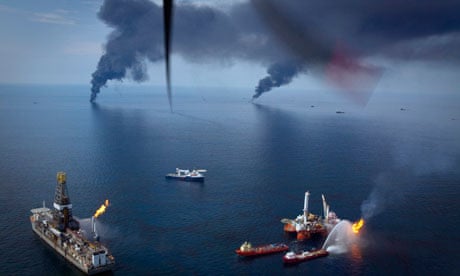The Obama administration has infuriated environmentalists by giving BP the green light to bid for new drilling rights in the Gulf of Mexico.
The move – seen as a major step in the company's political rehabilitation as an offshore driller following the Deepwater Horizon accident – was revealed by the head of the US safety regulator after a congressional hearing in Washington.
"They don't have a deeply flawed record offshore," said Michael Bromwich, head of the newly formed Bureau of Safety and Environmental Enforcement. "The question is: 'Do you administer the administrative death penalty based on one incident?', and we have concluded that's not appropriate."
Drilling rights are sold off on a regular basis but many believed BP would be ruled out as unsuitable after the gulf well blowout that killed 11 workers and polluted the beaches of southern states. The next sale comes up in December, when more than 8m hectares (20m acres) of offshore rights will come up for grabs.
BP declined to comment, but Friends of the Earth said it was appalled. "Governments should be administering the death penalty to all deepwater drilling rather than waiting for yet more devastating incidents like the Deepwater Horizon in the Gulf of Mexico or in any other part of the world," argued Craig Bennett, director of policy and campaigns at the environmental group.
"It is not just BP operations that are deeply flawed," he added. "There is not a single oil company that can say with a high degree of confidence that it can drill safely and how it will clear up if something goes wrong. It is clear in the context of climate change we need to develop new clean technologies, not hunt for fossil fuels in ever more remote and hard-to-reach areas."
BP has already introduced changes to its offshore safety regime that it claims now leaves it with tougher standards than the regulator demands, but it has yet to gain approval to drill new wells.
The oil company has for many years been the biggest operator in the gulf, but it was pilloried by politicians after the Deepwater Horizon spill and its former chief executive, Tony Hayward, was said to be the most hated person in the US.
Over the last 18 months, BP has gradually seen some of its reputation rebuilt, not least because several studies have suggested that US contractors on the project, such as Transocean and Halliburton, ought to share some of the blame. BP has also helped itself by paying for a massive clean-up and compensation programme, but it still faces huge lawsuits and even possible criminal charges.
On Thursday BP, Transocean, which owned the Deepwater Horizon rig, and well-cementing specialist Halliburton were formally charged with breaches of offshore regulations on 15 separate occasions. Each charge carries a maximum penalty of $35,000 per violation per day but the real threat to BP is if it is found guilty of gross negligence by any court – which would trigger billion-dollar claims under the US's Clean Water Act.
BP, now with its first American chief executive in Bob Dudley, was keen to emphasise the significance of the two contractors being drawn into the legal net, because those firms have argued that BP was at the heart of the Gulf accident. BP is trying to convince them to contribute their share of the compensation it has paid out already. "The issuance today of notices of non-compliance to BP, Transocean and Halliburton makes clear that contractors, like operators, are responsible for properly conducting their deepwater drilling activities and are accountable to the US government and the American public for their conduct," said BP in a statement.

Comments (…)
Sign in or create your Guardian account to join the discussion